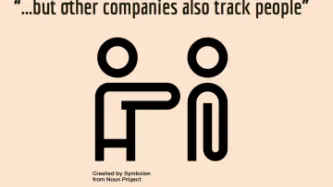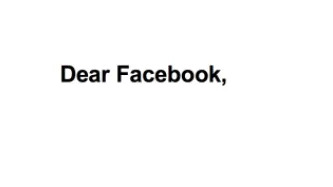Advanced Search
Content Type: News & Analysis
Planning and participating in peaceful protests against governments or non-state actors’ policies and practices requires the capacity of individuals to communicate confidentially without unlawful interference. From protests in support of LGBTI rights to protests against specific projects that undermine local communities’ wellbeing, these movements would not have been possible without the ability to exchange ideas and develop plans in private spaces.
Unlawful interference with…
Content Type: News & Analysis
We found this image here.
Today, a panel of competition experts, headed by Professor Jason Furman, the former chief economic adviser of in the Obama administration, confirmed that tech giants, like Facebook, Amazon, Google, Apple and Microsoft, do not face enough competition.
Significantly, the report finds that control over personal data by tech giants is one of the main causes preventing competition and ultimately innovation.
Privacy International's research has shown clear examples of…
Content Type: Long Read
(In order to click the hyperlinks in the explainer below, please download the pdf version at the bottom of the page).
Content Type: News & Analysis
In December 2018, we revealed how some of the most widely used apps in the Google Play Store automatically send personal data to Facebook the moment they are launched. That happens even if you don't have a Facebook account or are logged out of the Facebook platform (watch our talk at the Chaos Communication Congress (CCC) in Leipzig or read our full legal analysis here).Today, we have some good news for you: we retested all the apps from our report and it seems as if we…
Content Type: Examples
By 2018, Palantir, founded in 2004 by Peter Thiel to supply tools for finding obscure connections by analysing a wide range of data streams to the Pentagon and the CIA for the War on Terror, was supplying its software to the US Department of Health and Human Services to detect Medicare fraud, to the FBI for criminal probes, and to the Department of Homeland Security to screen air travellers and monitor immigrants. It was also supplying its software to police and sheriff's departments in New…
Content Type: Examples
In 2018, changes to Apple's rules for data collection led Facebook to withdraw its Onavo Protect VPN app from the app store. The app's function was to warn users when they were visiting potentially harmful websites and protected their data when using public wifi. However, the app also collected data on the other apps installed on the device, monitoring that violates Apple's changed rules. In response to accusations that Facebook used the data to identify and acquire competitors, the company…
Content Type: News & Analysis
One of the UN's largest aid programmes just signed a deal with the CIA-backed data monolith Palantir
Last week, the UN's World Food Programme (WFP) announced a partnership with Palantir, the controversial US-based data analytics company with deep links to US intelligence agencies. This is a deal that has serious consequences for the privacy and security of the 90-million-plus recipients of WFP aid each year. The reaction to the news that WFP and Palantir have entered into this partnership, amongst many in the data and development community was immediate, and visceral. After all, Palantir has a…
Content Type: Advocacy
UPDATE 13 February: Facebook announced that it would open up its Ad Archive API next month. Read Mozilla's statement about the response here.
On 11 February 2019, Privacy International joined Mozilla and 36 organisations in an open letter to Facebook call on Facebook to make good on its commitments to provide more transparency around political advertising ahead of the 2019 EU Parliamentary Elections.
Specifically, our open letter urges Facebook to:
Roll out a functional, open Ad…
Content Type: Examples
Affiliate marketers, who buy ad space in bulk, run campaigns, and earn commissions on the sales they generate, are behind some of the shady and misleading ads that pollute social media and the wider internet, despite also promoting some legitimate businesses such as Amazon and eBay. At one of several yearly conferences, a Berlin event sponsored by Stack That Money, included representatives from Facebook, "Your Computer May Be Infected", "You Won an iPhone", a Russian promoter of black mask face…
Content Type: Examples
In October 2018, researcher Johannes Eichstaedt led a project to study how the words people use on social media reflect their underlying psychological state. Working with 1,200 patients at a Philadelphia emergency department, 114 of whom had a depression diagnosis, Eichstaedt's group studied their EMRs and up to seven years of their Facebook posts. Matching every person with a depressive diagnosis with five who did not, to mimic the distribution of depression in the population at large, from…
Content Type: Examples
In 2018, WhatsApp founder Brian Acton responded to the Cambridge Analytica scandal by tweeting "It is time. #deletefacebook." He also left the company, walking away from $850 million in unvested stock rather than accede to Facebook's plans to add advertising and commercial messaging, a purpose at odds with WhatsApp's encrypted environment. In 2014, Acton and his co-founder Jan Koum, sold WhatsApp to Facebook for $22 billion. Acton's wanted instead to monetise WhatsApp by charging users tiny…
Content Type: Examples
After a series of scandals, in the year up to September 2018 54% of American Facebook users had changed their privacy settings and 42% had skipped visiting the platform for several weeks or more. About 26% said they had deleted the Facebook app from their smartphone. Some 74% of Facebook users had taken at least one of these three actions, split evenly across Democrats and Republicans. Across age groups, younger users (18 to 29) were more likely to have deleted the app (44%), and only a third…
Content Type: Examples
Even after 2015, when Facebook said it had walled off user records from third parties, inside sources and court documents showed that the company went on maintaining a whitelist of companies that were allowed customised access to information about users' Friends, phone numbers, and a "friend link" metric that measured the degrees of separation. Whitelisted companies included Nissan and Royal Bank of Canada, and others that either advertised on the network or were valuable to Facebook for other…
Content Type: Examples
In July 2018, Facebook announced it was investigating whether the Boston-based company Crimson Hexagon had violated the company's policies on surveillance. Crimson Hexagon markets itself as offering "consumer insights". Its customers include a Russian non-profit with ties to the Kremlin, and multiple US government agencies. After pressure from civil liberties groups, Facebook put a policy in place in March 2017 barring the use of members' data for the purposes of government surveillance.…
Content Type: Examples
In May 2018 Facebook announced it would partner with organisations in places such as Myanmar and South Sudan in order to develop more "context-specific" knowledge about how its platform is being abused to create real risks of harm and violence. In Myanmar, where telephone companies allowed Facebook to offer free access, the number of users rose in tandem with the amount of online hate speech, most of it directed against the country's Muslim minority. Facebook wound up withdrawing its Free…
Content Type: Examples
In 2018, experiments showed that despite the company's denials, ads could be targeted at specific Facebook users via information that the users had never given Facebook, such as phone numbers.
The reason: Facebook allows advertisers to upload their own lists of phone numbers of email addresses, and the service will use them to put ads in front of users associated with those details. The company also uses information supplied for security purposes, including phone numbers provided for two-…
Content Type: Examples
In June 2018 Facebook announced it would install new controls to improve members' understanding of how companies targeted them with advertising, including letting them know if a data broker supplied the information. This was the second update to the company's policies in 2018; in March it attempted to ban the use of data brokers but pulled back when advertisers threatened to pull their business.
https://uk.reuters.com/article/us-facebook-privacy-broker/facebook-releases-new-privacy-safeguards-…
Content Type: News & Analysis
Palantir and the UN’s World Food Programme (WFP) are partnering for a reported $45 million. Palantir, a US-based company that sells data software and has been the centre of numerous scandals.
The World Food Programme provides assistance in food and nutrition to around 92 million people each year. Systems that are produced in agreements such as the one between WFP and Palantir increase risks to the people the they are attempting to help. There are risks to both individuals and whole populations…
Content Type: Examples
Facebook ads purchased in May 2016 by the Internet Research Agency, a notorious Russian troll farm, urged users to install the FaceMusic app. When installed, this Chrome extension gained wide access to the users' Facebook accounts and web browsing behaviour; in some cases it messaged all the user's Facebook Friends. The most successful of these ads specifically targeted American girls aged 14 to 17 and said the app would let them play their favourite music on Facebook for free and share it…
Content Type: Examples
Under a clause in the country's computer crime act that criminalises uploading content that is false or causes "panic", in 2018, Thailand's ruling military junta pursued a criminal investigation into a live feed on the Facebook page belonging to the rising Future Forward Party. The postings claimed that the governing party, the National Council for Peace and Order, which seized power in 2014 was using the threat of lawsuits to recruit former MPs from rival parties. The NCPO has promised to hold…
Content Type: Examples
In the run-up to the November 2018 US midterm elections, Vice tested Facebook's new system of mandatory "Paid for" disclosure intended to bring greater transparency to the sources of ads relating to "issues of national importance". Placing political ads requires a valid ID and proof of residence. Vice found that Facebook quickly approved ads the site attempted to place that named Islamic State, US vice president Mike Pence, and Democratic National Committee chair Tom Perez in the "Paid for"…
Content Type: Examples
In the run-up to the 2018 US mid-term elections, researchers found that the dissemination of fake news on Facebook was increasingly a domestic American phenomenon rather than, as in the 2016 presidential election, an effort driven by state-backed Russian operatives. Removing such accounts (Twitter) and pages (Facebook) is tricky in the US, where the boundary between free speech and disinformation is particularly sensitive. In addition, domestic disinformation is harder to distinguish. One of…
Content Type: Examples
In 2014, a team of four Swedish and Polish researchers began scraping every comment and interaction from 160 public Facebook pages. By two years later, they had collected one of the largest sets of user data ever assembled from the social network; it enabled them to track the behaviour of 368 million members. Techniques like those the researchers used have been used by scholars around the world for a decade to compile hundreds of Facebook data sets of all sizes. Many have been used for research…
Content Type: Examples
Between May 18 and May 22, a bug in Facebook's system changed the settings on 14 million users' accounts so that newly posted updates they thought were private might have been made public instead. The company attributed the error to a mistake made in redesigning how the public parts of user profiles are displayed. After Facebook found the bug, it was another five days before all privacy settings were correctly restored.
https://www.washingtonpost.com/news/the-switch/wp/2018/…
Content Type: Examples
In July 2018, the leader of a private Facebook group for women with the BRCA gene, which is associated with high breast cancer risk, discovered that a Chrome plug-in was allowing marketers to harvest group members' names and other information. The group was concerned that exposure might lead to other privacy violations and discrimination from insurers. The company shut down the extension and closed the loophole. The case is of particular concern because the US Heath Insurance Portability and…
Content Type: Examples
In announcing a data breach in 2018, at first Facebook said 50 million people's data had been accessed, then 30 million - but the data accessed was more sensitive than they thought at first. After investigation, the company explained that it had identified four stages of attack with a different group of victims affected in each one. The attackers used an automated technique to move from the first small group of accounts they controlled to others, stealing access tokens of friends and friends of…
Content Type: Examples
In August 2018, Facebook announced it would remove more than 5,000 ad targeting options in order to prevent discrimination. Options specifying the exclusion of people interested in "Passover", "Native American culture", or "Islam" could be used as proxies to allow advertisers to exclude ethnic and religious groups in contravention of the law. The announcement came shortly after the US Department of Housing and Urban Development filed a complaint alleging that the company had enabled…
Content Type: Examples
Days before the US November 2018 midterm elections, ProPublica discovered that an organisation called Energy4US spent $20,000 to run ads on Facebook pushing conservatives to support the Trump administration's reversal of fuel emission standards. On closer scrutiny, Energy4US appeared to be a front organisation for the trade association American Fuel and Petrochemical Manufacturers, which numbers the world's largest oil companies among its members. Although Facebook's announced requirement that…
Content Type: Examples
In October 2018, in the wake of the Cambridge Analytica scandal and questions over Facebook's influence on the UK's EU referendum, Facebook announced it would add Britain to the US and Brazil on the list of countries where the company will no longer allow political groups to publish "dark" ads on its network. Among the changes: all paid-for political content will be automatically published in a public library for up to seven years; individuals and organisations running ads with political…





























